OK, so if there was anyone uniquely positioned to be the authority on gluten-free wine, I guess it would be me. (If you already know that I'm a fifth-generation winegrape grower that ran a vintner's association, welcome back! If not, Hi There! I'm KC, the Founder of G-Free Foodie.)
I wrote a post about Gluten-Free Vodka, and in it I stated that I am not worried about gluten in wine, and I don't think you should be, either. Oh, the emails! So, here's the info I've used, along with real-world-in-several-wineries-experience, to assert that Wine is Gluten-Free.
It should be noted that all U.S. gluten-free governing and advocacy bodies, including Beyond Celiac, Celiac Disease Foundation + Center for Celiac Disease Research have ruled that wine is gluten-free, plus the FDA.
You read it, you decide: it's your health, after all.
*Before We Begin: wine drinks are not WINE
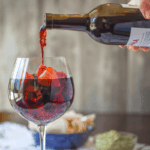
I am not talking about Wine Drinks, Wine Coolers, Flavored Wines or other beverages that get all loose with the definition of wine. If the beverage you're drinking contains anything other than 100% real wine, you're playing White-Russian Roulette & will probably get dosed. If you want a wine drink, make sangria or a spritzer, it's easy, delicious & safe.
- Wine is made from 100% grapes (or in some cases, other fruit, like pomegranates), that's it, that's all. Grapes and yeast in barrels or tanks. No grains of any kind.
- In almost every case, wine is gluten-free to well below 20 parts per million. The only exception to this is wine-based beverages, like those mentioned above.
Wait a minute here, I read an article about wheat paste used in wine barrels. What about that?
To quote my previous statement on this issue: Barrel paste VERY rarely contains wheat anymore – that is a mostly European practice. Further, the paste rarely touched the wine, and in the case that it did, the extended fermentation period would kill all traces of the gluten protein.
Also, glutenfreewatchdog.com ran a series of tests on wine stored in barrels sealed with wheat paste and found the wine to be safe.
So – I’m not worried about it, and I don’t think you should be either. If you want to be super-safe, drink domestic wines or those that are tank fermented. (In tank fermentation, the wine is made in stainless steel tanks. Oak planks called "staves" are sometimes put in the tanks to add oak flavors.)
I also read that gluten is used to filter wine! How about that?
Yeah, that's a good question. The answer is: they don't use gluten to filter wine.
Some winemakers do, however, use products made from other allergens, including: micronized potassium casseinate (that's casein, for you GFCF folks), skim milk powder (rarely), gelatin, egg whites or egg albumin, and isinglass (from fish.) There are lots of other filtering and fining agents too. Most of them more popular than those I just listed, so not all wines come into contact with allergens.
But I drank some wine and I feel gross. Why?

Well, did you drink too much? I know, I know, that's too obvious. So let's talk about why you might be feeling icky.
1 - I listed several filtering agents above. If you have a problem with any of those, that could be the reason.
2 - Sulfites. Guess what? Sulfites are naturally occurring in wine (although more are usually added) and most wines contain LESS than 10 times the amount of sulfites in dried fruits. However, if you are sensitive to sulfa, or you drank the wine while eating a bunch of dried apricots or sun-dried tomatoes, it could be the culprit. The best sulfur-free wines I've tried are from Frey Vineyards in Mendocino.
3- You have severe asthma. Those who have serious breathing problems may have trouble metabolizing sulfites, but don't have a true sulfa allergy.
4 - If red wines seem to bother you more than white wines, you may be sensitive to the tannins. Try reds with lower tannin levels instead.
Of course, I can't go without mentioning Birdstone Winery, the folks that hosted our first G-Free Foodie Eat Well Event. Their Dolcetto & Primitivo are two of my favorite red wines, and the Dolcetto is low in tannins.
So, is wine gluten-free?
Yes, wine is gluten-free. That is, unadulterated wine, not wine cocktails or coolers or "wine beverages."
Hope that helps - See you in the Tasting Room!
KC
Vineyards vs. Wineries: a Crash Course
While we're on this topic, let me clarify something: a vineyard is where they GROW the grapes, a winery is where they make the wine. Some companies do grow the fruit and make the wine, sometimes they even do it all in one place. In that case, the wine is an "estate" wine. But owning a vineyard doesn't make somebody a winemaker anymore than owning a cattle ranch makes them the chef in a steakhouse. Certainly the quality of the fruit matters, it matters immensely, but so does the quality of the steak.
A Word About Closures:
Cork itself does not contain gluten. Cork is a natural material grown on cork trees, the rubbery substance in cork in called Suberin, which occurs in the plant. Synthetic corks are made from plastics. Other bottle-top closures include Vino-Seal style t-tops (plastic), glass t-tops, screw caps (metal & plastic), ZORKs (metal and plastic), and other plastic options. Of course there are bag-in-the-box and large scale restaurant wine dispensing equipment, which are also safe.


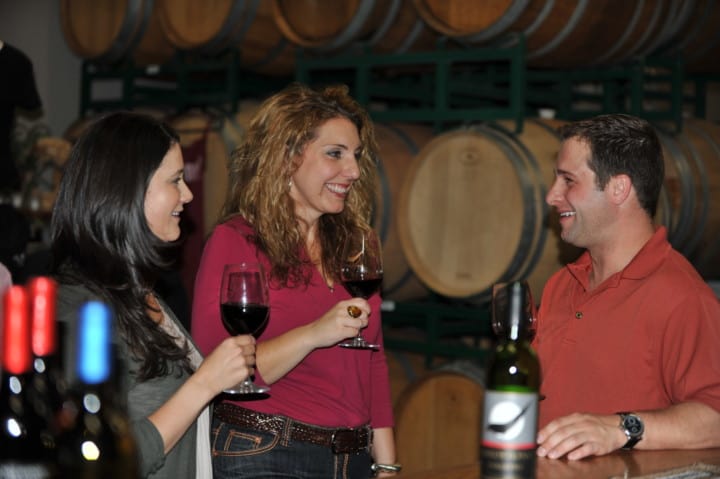

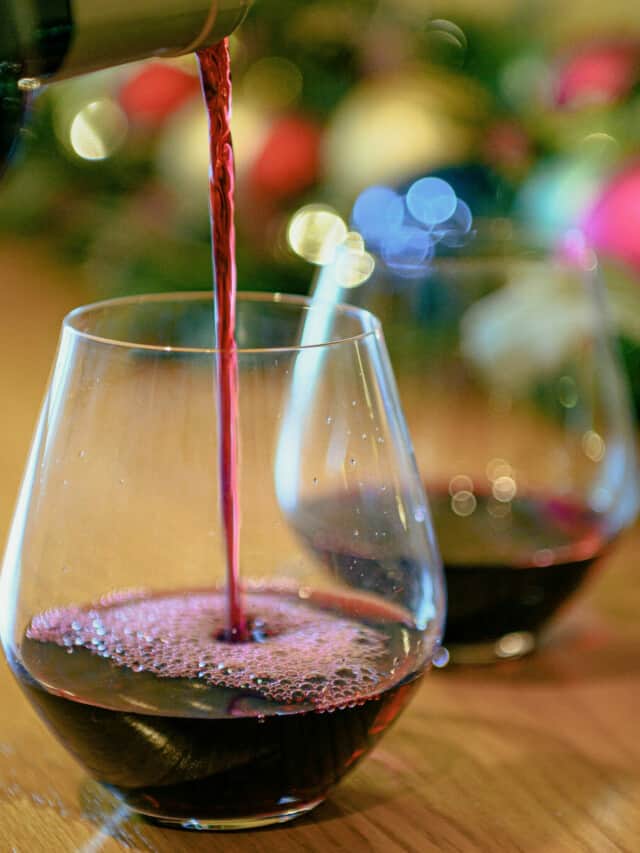
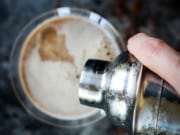

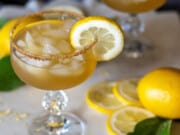


Margaret Grahlman says
Would like to be a vendor at your next event. Sorry I was already obligated last time and really wished I could have been with you. YOU SWEET THING JELLY are gluten free. =)
Rita Whitaker Haun says
Hi,
When I drank wine after a full repairvite/clearvite digestive system/liver-gall bladder cleanse, the white wine I drank made my heart feel depressed with the first sip, my arms with the second sip, and my legs with the third sip. (Needless to say, I didn't drink anymore sips) Any ideas?
Administrator says
We'd suggest talking that over with your DR, Rita. Not sure on that one. Let us know what you find out!
dori says
Hi KC, could you possibly comment on wine causing tinnitus to act up. My husband has mild ear ringing, nothing to constant, however when he drinks a bit too much red wine or beer, which I know for sure has gluten in it. his ringing seems to get worse and hang around for a few days. I also want to mention that he does have allergies and is fond of drinking only red wine because he insist that white has no health benefits. I'll be checking back for your reply.
Thanks,
Dori
Mrs P says
Dori,
Your husband may want to be screened for Lyme disease. Lyme often weakens the thyroid, Gluten can provoke an autoimmune thyroid attack and make other symptoms flare, like tinnitus. Google Lyme tinnitus and you should find plenty Of info.
Hope all is well.
a. orr says
Are all organic wines then low in sulfites necessarily? Not to belabor the issue, just trying to feel better when having a glass of white wine these days as a gluten intolerant. Suspecting an additional cross allergic reaction to possibly eggs though. Thanks for the informative article.
dhenwinez says
nice blog winery . . , ,
https://plus.google.com/106255870364991854825/posts
KC @ G-Free Foodie says
Dori - I agree with Mrs. P - he needs to be screened for additional issues if he has ear ringing. You're correct, Beer has Gluten, unless he is drinking G-Free Beer (List here: https://gfreefoodie.com/g-free-foodie's-gluten-free-beer-list-updated/ ) there are some helth benefits from white wine, but red is much higher in antioxidants.
@ a. orr, I'd do some wine tasting with wines that are lower in sulfites & see how you feel - but if you can eat 1 full piece (like an apricot half) of dried fruit & not have a problem, your issue isn't the sulfites, it's more likely the tannins.
V says
Am I reading/understanding correctly that yeast is used in the wine making process? I am allergic to bakers and brewers yeast. People keep trying to buy gluten free beer and cider for me but I can't drink it!
Administrator says
"Wild" yeast naturally occurs in grapes, and while some winemakers use only natural yeast, most add some form of the Saccharomyces species of yeast (which is also the strain for baker's yeast.)
My favorite wines made from only Wild Yeast are from idle Hour Winery: http://www.idlehourwinery.com/
KC
LKP says
Dori, your husband sounds like me, for years I have had tinnitus come and go, sometimes bad enough that I have trouble understanding speech, other times non-existent. I never really found any correlation until I had kids who were having enough troubles with ADD and behavior that I did some research and found the Feingold Diet. Part of the diet had to do with lowering foods that contain naturally high levels of salicylates. The theory is that people sensitive to salicylates have low levels of the enzyme the body needs to break down the salicylates, without it the salicylates accumulate toxins in the brain and it takes days for them to clear out. Grapes and I believe hops and some grains are naturally high in salicylates (also true of apples, Oranges and many traditional healthy fruits) Mangoes, pears and lemons and limes are low go figure). Oddly enough the tinnitus shows up in adults and that was my revelation, I had had trouble but never knew why when i was a kid,I stated paying attention to what I had eaten when the ringing got bad and I realized it was the high salicylate foods.The best way to avoid it is to stay away or at least minimize high salicylate foods, but Epsom salt baths can help it go away faster. i have even started taking a pinch (ONLY a pinch) in water or once or twice a day to speed things up. See feingold.org for more info on salicylates and ways to cope.
Jen says
I am GFCF and a huge wine fan. How can I tell if wine has been strained through the potassium cassienate? Will it state that in the label??
Thanks!
Administrator says
Nope. It won't be labeled. There shouldn't be any filtering agents left behind, but i warned you just in case.
You can always call or email the winery - back labels contain contact info for production and/or bottling.
If a wine bothers you, I'd choose a different one.
KC
R. O'Quinn says
What about wines that are made with "wine nutrients" that contain barley?
Administrator says
The Gluten Protein is essentially "left behind" in the fermentation process. This would be true in the case of added wine nutrients - unless of course, you're drinking "Barley Wine" - made from barley and not grapes.
KC
Terry says
Thanks for sharing your knowledge with us. The mixture of pasta and wine have an amplified alcoholic effect on me. Doesn't seem to happen with anything else. It's extremely frustrating trying to figure it out.
Any ideas?
gwen says
Terry:
It is possible your body has a sugar/yeast build up and is struggling with trying to process too much at the same time. I have heard of this happening before where the body has held onto too much yeast, has a backup if you will, and as foods turn to sugar (usually at an abnormal rate of speed) it feeds the yeast and it literally makes you "drunk". There are different theories on this.
I do personally know someone who literally drank two beers over the course of 6 or so hours while eating on and off at a cookout. He ended up in the emergency room several hours later, and the doctors thought he was drunk. His blood alcohol level definitely qualified him, yet he had only had the two beers hours before the ER visit.
Hope this helps!
Lisa says
Any chance that some of the wines are aged in whiskey barrels? Being celiac and very sensitive I could see that being a possible issue.
K.C. Pomering says
nope. wine is aged is wine barrels, whiskey in whiskey barrels.